Unit 5 Do you have a soccer ball? 重点知识复习课件
文档属性
| 名称 | Unit 5 Do you have a soccer ball? 重点知识复习课件 | 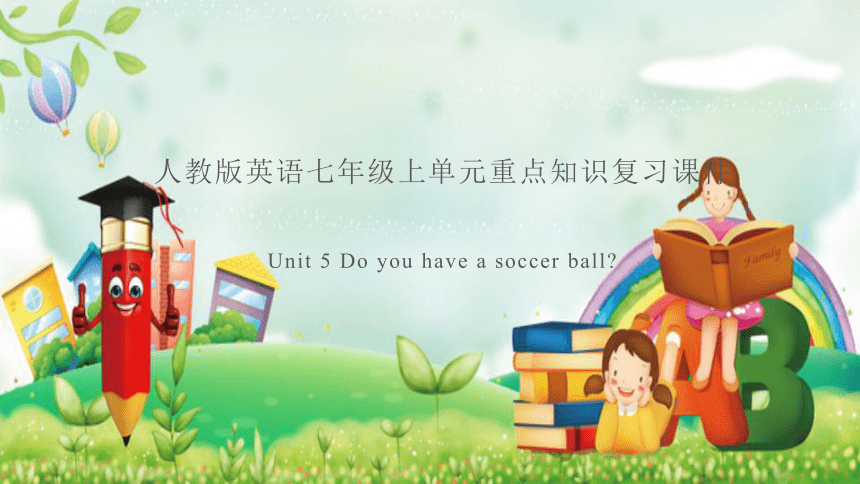 | |
| 格式 | pptx | ||
| 文件大小 | 603.2KB | ||
| 资源类型 | 试卷 | ||
| 版本资源 | 人教新目标(Go for it)版 | ||
| 科目 | 英语 | ||
| 更新时间 | 2022-10-10 08:25:47 | ||
图片预览

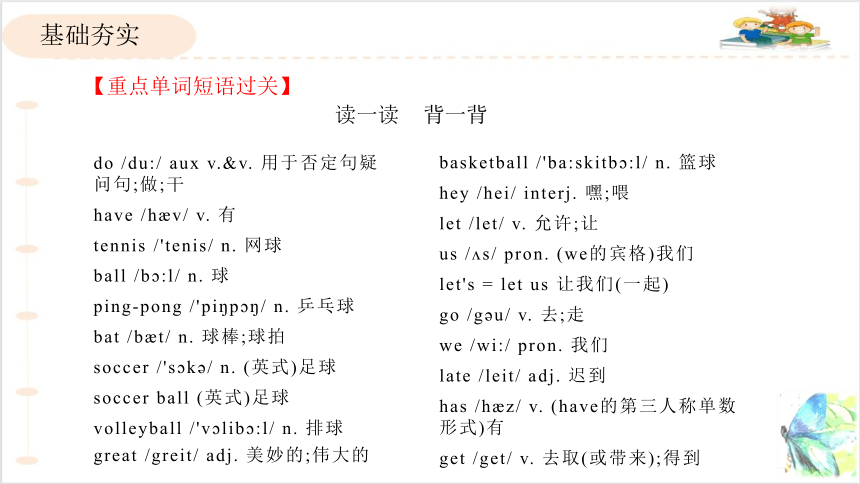
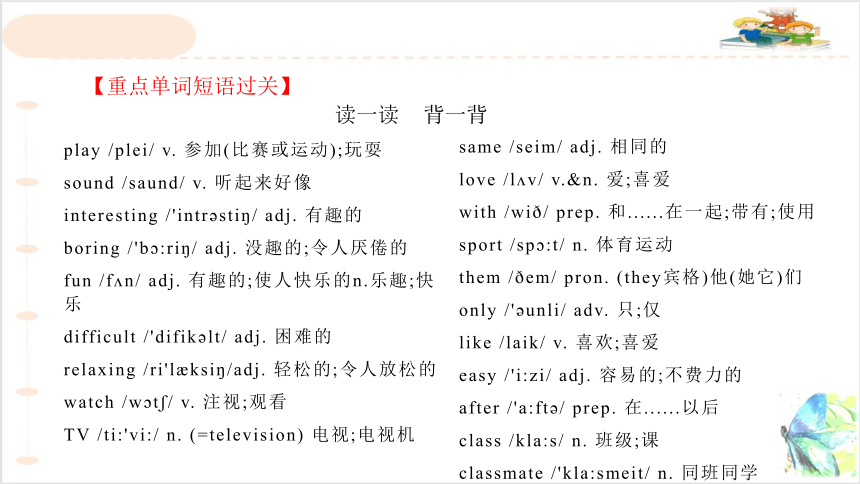
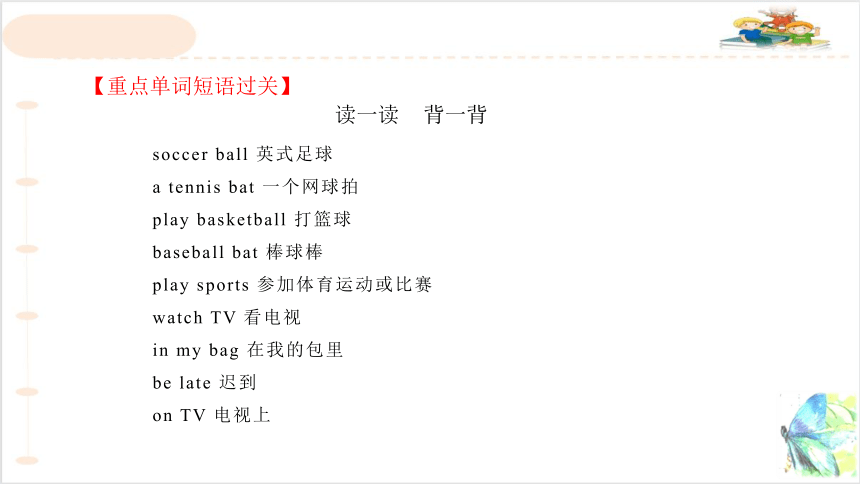
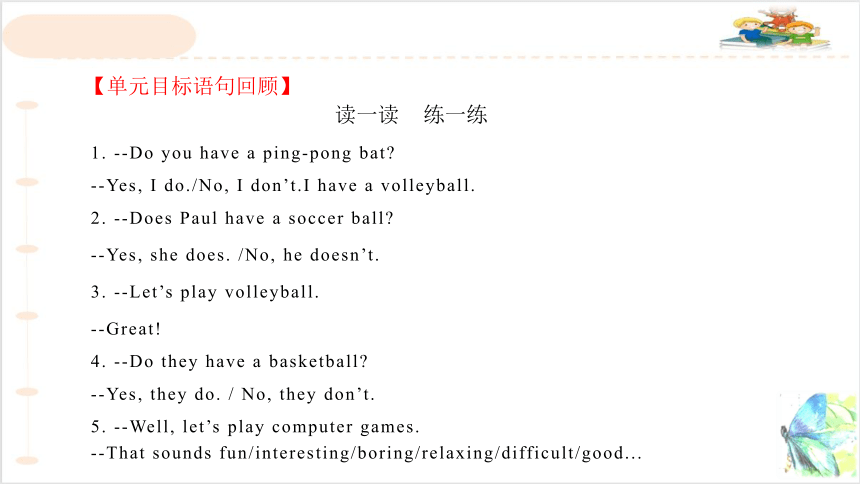
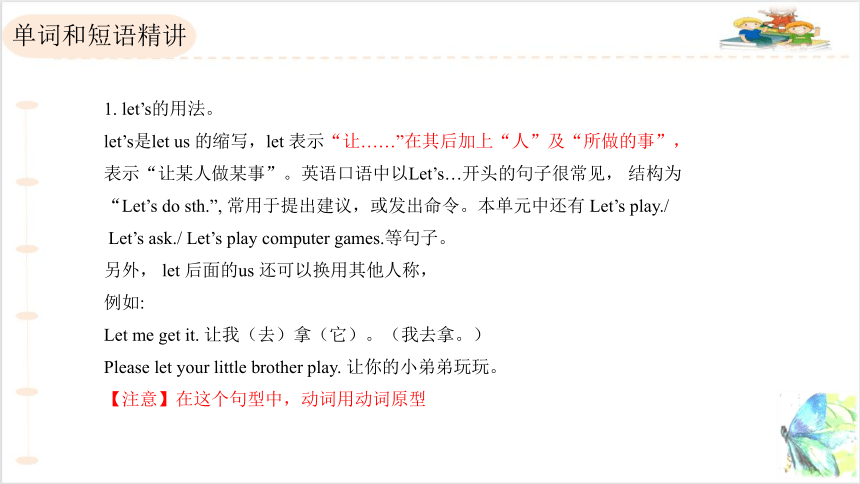
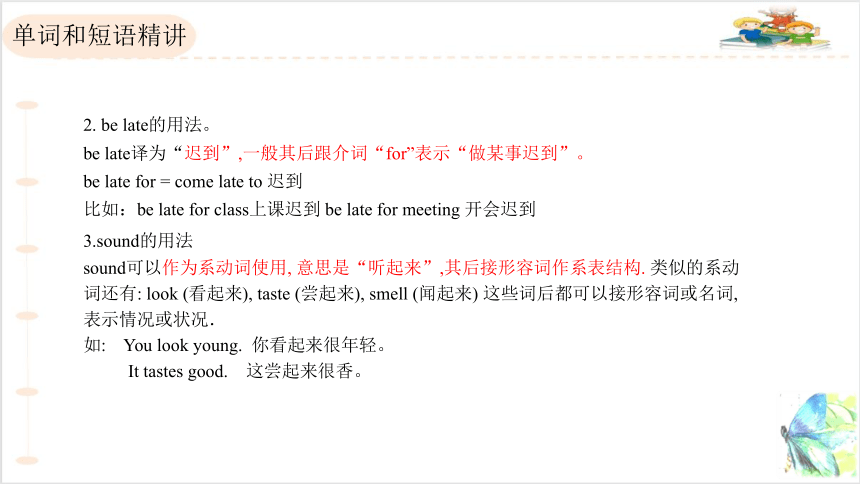
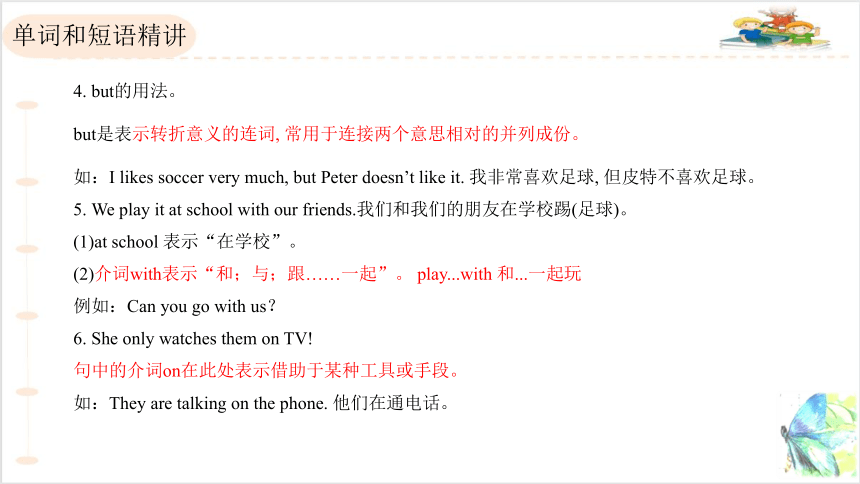
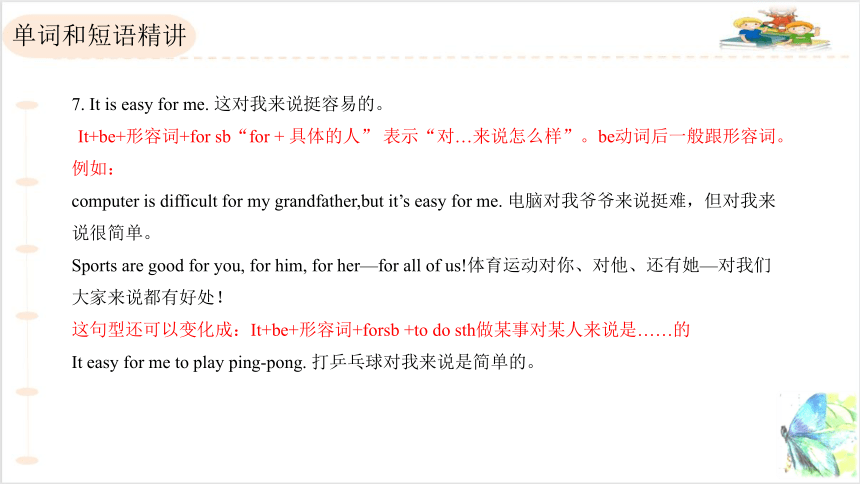
文档简介
(共23张PPT)
人教版英语七年级上单元重点知识复习课件
Unit 5 Do you have a soccer ball
do /du:/ aux v.&v. 用于否定句疑问句;做;干
have /h v/ v. 有
tennis /'tenis/ n. 网球
ball /b :l/ n. 球
ping-pong /'pi p / n. 乒乓球
bat /b t/ n. 球棒;球拍
soccer /'s k / n. (英式)足球
soccer ball (英式)足球
volleyball /'v lib :l/ n. 排球
great /greit/ adj. 美妙的;伟大的
基础夯实
basketball /'ba:skitb :l/ n. 篮球
hey /hei/ interj. 嘿;喂
let /let/ v. 允许;让
us / s/ pron. (we的宾格)我们
let's = let us 让我们(一起)
go /g u/ v. 去;走
we /wi:/ pron. 我们
late /leit/ adj. 迟到
has /h z/ v. (have的第三人称单数形式)有
get /get/ v. 去取(或带来);得到
【重点单词短语过关】
读一读 背一背
play /plei/ v. 参加(比赛或运动);玩耍
sound /saund/ v. 听起来好像
interesting /'intr sti / adj. 有趣的
boring /'b :ri / adj. 没趣的;令人厌倦的
fun /f n/ adj. 有趣的;使人快乐的n.乐趣;快乐
difficult /'difik lt/ adj. 困难的
relaxing /ri'l ksi /adj. 轻松的;令人放松的
watch /w t / v. 注视;观看
TV /ti:'vi:/ n. (=television) 电视;电视机
same /seim/ adj. 相同的
love /l v/ v.&n. 爱;喜爱
with /wi / prep. 和......在一起;带有;使用
sport /sp :t/ n. 体育运动
them / em/ pron. (they宾格)他(她它)们
only /' unli/ adv. 只;仅
like /laik/ v. 喜欢;喜爱
easy /'i:zi/ adj. 容易的;不费力的
after /'a:ft / prep. 在......以后
class /kla:s/ n. 班级;课
classmate /'kla:smeit/ n. 同班同学
【重点单词短语过关】
读一读 背一背
soccer ball 英式足球
a tennis bat 一个网球拍
play basketball 打篮球
baseball bat 棒球棒
play sports 参加体育运动或比赛
watch TV 看电视
in my bag 在我的包里
be late 迟到
on TV 电视上
【重点单词短语过关】
读一读 背一背
1. --Do you have a ping-pong bat
--Yes, I do./No, I don’t.I have a volleyball.
2. --Does Paul have a soccer ball
--Yes, she does. /No, he doesn’t.
3. --Let’s play volleyball.
--Great!
4. --Do they have a basketball
--Yes, they do. / No, they don’t.
5. --Well, let’s play computer games.
--That sounds fun/interesting/boring/relaxing/difficult/good...
【单元目标语句回顾】
读一读 练一练
单词和短语精讲
1. let’s的用法。
let’s是let us 的缩写,let 表示“让……”在其后加上“人”及“所做的事”,
表示“让某人做某事”。英语口语中以Let’s…开头的句子很常见, 结构为
“Let’s do sth.”, 常用于提出建议,或发出命令。本单元中还有 Let’s play./
Let’s ask./ Let’s play computer games.等句子。
另外, let 后面的us 还可以换用其他人称,
例如:
Let me get it. 让我(去)拿(它)。(我去拿。)
Please let your little brother play. 让你的小弟弟玩玩。
【注意】在这个句型中,动词用动词原型
单词和短语精讲
2. be late的用法。
be late译为“迟到”,一般其后跟介词“for”表示“做某事迟到”。
be late for = come late to 迟到
比如:be late for class上课迟到 be late for meeting 开会迟到
3.sound的用法
sound可以作为系动词使用, 意思是“听起来”,其后接形容词作系表结构. 类似的系动词还有: look (看起来), taste (尝起来), smell (闻起来) 这些词后都可以接形容词或名词, 表示情况或状况.
如: You look young. 你看起来很年轻。
It tastes good. 这尝起来很香。
单词和短语精讲
4. but的用法。
but是表示转折意义的连词, 常用于连接两个意思相对的并列成份。
如:I likes soccer very much, but Peter doesn’t like it. 我非常喜欢足球, 但皮特不喜欢足球。
5. We play it at school with our friends.我们和我们的朋友在学校踢(足球)。
(1)at school 表示“在学校”。
(2)介词with表示“和;与;跟……一起”。 play...with 和...一起玩
例如:Can you go with us?
6. She only watches them on TV!
句中的介词on在此处表示借助于某种工具或手段。
如:They are talking on the phone. 他们在通电话。
单词和短语精讲
7. It is easy for me. 这对我来说挺容易的。
It+be+形容词+for sb“for + 具体的人” 表示“对…来说怎么样”。be动词后一般跟形容词。例如:
computer is difficult for my grandfather,but it’s easy for me. 电脑对我爷爷来说挺难,但对我来说很简单。
Sports are good for you, for him, for her—for all of us!体育运动对你、对他、还有她—对我们大家来说都有好处!
这句型还可以变化成:It+be+形容词+forsb +to do sth做某事对某人来说是……的
It easy for me to play ping-pong. 打乒乓球对我来说是简单的。
8. play的用法
play的基本意思是指为了消遣和娱乐而进行身体的或精神的活动,即“玩,玩耍”,除此外还有一些其他的用法。
①.表示“打”球,,后接表示球类的名词,不与冠词连用;表示“与(对手)比赛”,常与against连用,也可省略against.
They've been playing football a lot lately.最近他们一直踢足球.
Tom is playing (against) John in the tennis match.这场网球赛是汤姆对约翰.
②.表示“演奏”乐器,后接表示乐器的名词,与the连用;接表示音乐的名词,与a(n)或the连用;接以人代表作品的名词,则不与冠词连用.
The girl played the piano quite beautifully.这女孩钢琴弹得很漂亮.
The children are playing a march.孩子们正在演奏一首进行曲.
She plays Chopin very well.她演奏萧邦的作品很出色.
单词和短语精讲
③.表示“打(牌);下(棋)”,不与冠词连用,但与game连用时,常与the连用.
Do you like playing bridge / cards / poker 你喜欢打桥牌/牌/扑克吗
They often play chess.他们经常下棋.
He will show us how to play the game.他将给我们演示怎样玩这个游戏.
④.表示“演出;扮演;假扮”,后接名词时用不用冠词要看情况来定.
The children played doctors and nurses.孩子们假扮医生和护士玩.
She played the part of the mother-in-law.她扮演婆婆.
⑤.常用短语有play with玩弄,比赛;play a part / role in起……作用;play a trick on捉弄;play a joke on开玩笑;play at 玩某种游戏;play back重放(录音、唱片等).
She was playing with the idea of studying abroad.她动起了出国留学的念头(但并非很认真).
She never plays (at) cards.她从来不玩牌.
单词和短语精讲
9. interest, interested 和interesting
(1)interest n. 趣味 ; v. 使(人)发生兴趣 ,其主语多为事物
例如:Your story interests me. 你的经历引起了我的兴趣。
(2)interesting adj. 有趣味的, 引起兴趣的;着重于主动意味;可作表语或定语; 能修饰人,也能修饰物 。
例如:This new book is very interesting. 这本新书很有趣。
She’s a most interesting man.她是个很有趣的人。
(3)interested adj. 感兴趣的, 对……有兴趣的,着重于被动意味,其主语一般为人,且多在系动词be,get,become等后作表语 。
例如:At the age of eight, the girl became interested in boating .
单词和短语精讲
单词和短语精讲
10. difficult的用法
(1) adj.困难的
例句:The difficult part is learning the new computer codes after that it's all downhill.困难的部分是学会计算机的新编码,其余就轻而易举了。
(2)不随和的;执拗的;不易相处的
例句:He is a difficult man to get along with .他是个不易相处的人。
【词义辨析】:difficult和hard
这两个形容词均有“困难”之意。 difficult比hard较为正式,侧重需要特别的能力、智力、判断力、技巧或勇气才能克服障碍。也可指深奥或抽象的难题。 hard含义广,通俗用词,与easy相对,泛指任何难理解,不好处理或不易做的事。
【拓展】difficult的名词为difficulty,表示“困难,艰难,难事”,既可以做可数名词也可以做不可数名词,具体使用情景如下:
单词和短语精讲
difficulty用作不可数名词,表示泛指的笼统困难,意为"困难、艰难",常用在以下句型中have no/find(some,any,much) difficulty with sth./(in) doing sth.
There is no (some,any,much) difficulty (in) doing sth.
difficulty用作可数名词,表示某种具体的困难,意为"难事,难点,困境,难处".
In face of so many difficulties,we never appeared to be afraid.
Young children have difficulty grasping the finality of death. 小孩子很难理解死亡的不可改变性。
I had some difficulty at first recalling why we were there. 刚开始回想我们为什么会在那儿时我有些费劲。
语法知识精讲
1. 行为动词的一般现在时
(1)一般现在时:一般现在时用来表示经常性或习惯性的动作或现在的状态。
(2)一般现在时中的谓语动词形式。
①主语是第一、第二人称、第三人称复数或复数名词时,行为动词以原形出现。
②主语是第三人称单数或单数名词时,行为动词要相应地使用其第三人称单数形式。
(3)一般现在时的句式变换。
①变否定句时,当主语是第一、第二人称、第三人称复数或复数名词时,在行为动词前加don’t;当主语是第三人称单数或单数名词时,在行为动词前加doesn’t。
②变一般疑问句时,当主语是第一、第二人称、第三人称复数或复数名词时,在句首加助动词do;当主语是第三人称单数或单数名词时,在句首加助动词does。 其肯定回答为“Yes, 主语+do/does.”,否定回答为“No, 主语+don’t/doesn’t.”
语法知识精讲
2.have / has的用法
谓语动词have在句中有两种形式,即have和has。
have用于第一人称 (I, we), 第二人称 (you), 以及第三人称复数 (they)或其他复数名词等后; has用于第三人称单数(he,she,it或单数名词)后。
如:I have a baseball. 我有一个棒球。
They have some good friends. 他们有一些好朋友。
Tom has a Chinese friend. 汤姆有一位中国朋友。
The school has three grades. 这所学校有三个年级。
变否定句时,需要借助助动词do或 does 的否定形式。
主语为非第三人称单数时, 句型为:主语+don’t have...
如:I don’t have a baseball. 我没有棒球。
主语为第三人称单数时, 句型为:主语+doesn’t have...
如:My sister doesn’t have a watch. 我的妹妹没有手表。
语法知识精讲
变一般疑问句时,也需要借助助动词do及其第三人称单数形式does。
主语为非第三人称单数时,句型为:Do+主语+have...
主语为第三人称单数时,句型为:Does+主语+have...
肯定回答: Yes, 主语+do / does.
否定回答: No, 主语+don’t / doesn’t.
如:
—Do you have a basketball 你有篮球吗?
— Yes, I do. / No, I don’t. 是的,有。/ 不,没有。
— Does he have a tennis racket 他有一个网球拍吗?
— Yes, he does. / No, he doesn’t. 是的,他有。/ 不,他没有。
实战演练
一、单项选择。
1.—Do you have a soccer ball
—_________.
A. Yes, I don’t B. No, I do
C. No, I doesn’t D. No, I don’t
2. ____ Jim ____ his homework every evening
A. Do, does B. Do, do C. Does, do D. Is do
3. Let’s ______ shopping together!
A. do B. does C. to go D. going
4. I ________ TV at night(在晚上).
A. look at B. see C. watch D. Look
D
C
A
C
实战演练
一、单项选择。
5. The question is not easy. It’s very ____.
A. difficult B. difficulty C. relaxing D. not difficult
6. Let’s play _____ basketball. I don’t like playing
_____violin(小提琴)at home.
A. the; the B. the; / C. /;the D. /; /
7. Let’s ____ and ____ football on the playground.
A. to go; to play B. go; play C. to go; play D. go;to play
8. — Listen! The song ______ beautiful!
— Yes. It’s great!
A. hears B. listens C. listens to D. sounds
A
C
B
D
实战演练
二、用所给词的正确形式填空。
1. That __________(sound) relaxing.
2. ________ you __________(have) a baseball bat
3. My brother _________(have) a baseball bat.
4. She __________(play) sports every day.
5. __________ your friend _________(like) sports
6. Let ________(we) play tennis.
7.That’s an ___________(interest) computer game.
sounds
Do
have
has
plays
Does
like
us
interesting
实战演练
三、按要求完成下列各题。
1. I have two ping-pong bats. (改为一般疑问句)
_______ _______ ______ two ping-pong bats
2. His brother has a soccer ball. (改为否定句)
His brother _________ _________ a soccer ball.
3. Do they like basketball (作否定回答)
_______, they _________.
4. I have a computer. (改为否定句)
I _______ ________ a computer.
Do you have
doesn’t have
No don’t
don’t have
实战演练
三、按要求完成下列各题。
5. She has a ping-pong ball. (改为一般疑问句)
________ she _________ a ping-pong ball
6. Her schoolbag is under the table. (对划线部分提问)
_________ ________ her schoolbag
7. Does Helen have a dictionary (作肯定回答)
Yes, ________ _________.
8. Do you have a soccer ball (作否定回答)
No, ________ _________.
Does have
Where is
she does
I don’t
实战演练
That's all.Thank you!
人教版英语七年级上单元重点知识复习课件
Unit 5 Do you have a soccer ball
do /du:/ aux v.&v. 用于否定句疑问句;做;干
have /h v/ v. 有
tennis /'tenis/ n. 网球
ball /b :l/ n. 球
ping-pong /'pi p / n. 乒乓球
bat /b t/ n. 球棒;球拍
soccer /'s k / n. (英式)足球
soccer ball (英式)足球
volleyball /'v lib :l/ n. 排球
great /greit/ adj. 美妙的;伟大的
基础夯实
basketball /'ba:skitb :l/ n. 篮球
hey /hei/ interj. 嘿;喂
let /let/ v. 允许;让
us / s/ pron. (we的宾格)我们
let's = let us 让我们(一起)
go /g u/ v. 去;走
we /wi:/ pron. 我们
late /leit/ adj. 迟到
has /h z/ v. (have的第三人称单数形式)有
get /get/ v. 去取(或带来);得到
【重点单词短语过关】
读一读 背一背
play /plei/ v. 参加(比赛或运动);玩耍
sound /saund/ v. 听起来好像
interesting /'intr sti / adj. 有趣的
boring /'b :ri / adj. 没趣的;令人厌倦的
fun /f n/ adj. 有趣的;使人快乐的n.乐趣;快乐
difficult /'difik lt/ adj. 困难的
relaxing /ri'l ksi /adj. 轻松的;令人放松的
watch /w t / v. 注视;观看
TV /ti:'vi:/ n. (=television) 电视;电视机
same /seim/ adj. 相同的
love /l v/ v.&n. 爱;喜爱
with /wi / prep. 和......在一起;带有;使用
sport /sp :t/ n. 体育运动
them / em/ pron. (they宾格)他(她它)们
only /' unli/ adv. 只;仅
like /laik/ v. 喜欢;喜爱
easy /'i:zi/ adj. 容易的;不费力的
after /'a:ft / prep. 在......以后
class /kla:s/ n. 班级;课
classmate /'kla:smeit/ n. 同班同学
【重点单词短语过关】
读一读 背一背
soccer ball 英式足球
a tennis bat 一个网球拍
play basketball 打篮球
baseball bat 棒球棒
play sports 参加体育运动或比赛
watch TV 看电视
in my bag 在我的包里
be late 迟到
on TV 电视上
【重点单词短语过关】
读一读 背一背
1. --Do you have a ping-pong bat
--Yes, I do./No, I don’t.I have a volleyball.
2. --Does Paul have a soccer ball
--Yes, she does. /No, he doesn’t.
3. --Let’s play volleyball.
--Great!
4. --Do they have a basketball
--Yes, they do. / No, they don’t.
5. --Well, let’s play computer games.
--That sounds fun/interesting/boring/relaxing/difficult/good...
【单元目标语句回顾】
读一读 练一练
单词和短语精讲
1. let’s的用法。
let’s是let us 的缩写,let 表示“让……”在其后加上“人”及“所做的事”,
表示“让某人做某事”。英语口语中以Let’s…开头的句子很常见, 结构为
“Let’s do sth.”, 常用于提出建议,或发出命令。本单元中还有 Let’s play./
Let’s ask./ Let’s play computer games.等句子。
另外, let 后面的us 还可以换用其他人称,
例如:
Let me get it. 让我(去)拿(它)。(我去拿。)
Please let your little brother play. 让你的小弟弟玩玩。
【注意】在这个句型中,动词用动词原型
单词和短语精讲
2. be late的用法。
be late译为“迟到”,一般其后跟介词“for”表示“做某事迟到”。
be late for = come late to 迟到
比如:be late for class上课迟到 be late for meeting 开会迟到
3.sound的用法
sound可以作为系动词使用, 意思是“听起来”,其后接形容词作系表结构. 类似的系动词还有: look (看起来), taste (尝起来), smell (闻起来) 这些词后都可以接形容词或名词, 表示情况或状况.
如: You look young. 你看起来很年轻。
It tastes good. 这尝起来很香。
单词和短语精讲
4. but的用法。
but是表示转折意义的连词, 常用于连接两个意思相对的并列成份。
如:I likes soccer very much, but Peter doesn’t like it. 我非常喜欢足球, 但皮特不喜欢足球。
5. We play it at school with our friends.我们和我们的朋友在学校踢(足球)。
(1)at school 表示“在学校”。
(2)介词with表示“和;与;跟……一起”。 play...with 和...一起玩
例如:Can you go with us?
6. She only watches them on TV!
句中的介词on在此处表示借助于某种工具或手段。
如:They are talking on the phone. 他们在通电话。
单词和短语精讲
7. It is easy for me. 这对我来说挺容易的。
It+be+形容词+for sb“for + 具体的人” 表示“对…来说怎么样”。be动词后一般跟形容词。例如:
computer is difficult for my grandfather,but it’s easy for me. 电脑对我爷爷来说挺难,但对我来说很简单。
Sports are good for you, for him, for her—for all of us!体育运动对你、对他、还有她—对我们大家来说都有好处!
这句型还可以变化成:It+be+形容词+forsb +to do sth做某事对某人来说是……的
It easy for me to play ping-pong. 打乒乓球对我来说是简单的。
8. play的用法
play的基本意思是指为了消遣和娱乐而进行身体的或精神的活动,即“玩,玩耍”,除此外还有一些其他的用法。
①.表示“打”球,,后接表示球类的名词,不与冠词连用;表示“与(对手)比赛”,常与against连用,也可省略against.
They've been playing football a lot lately.最近他们一直踢足球.
Tom is playing (against) John in the tennis match.这场网球赛是汤姆对约翰.
②.表示“演奏”乐器,后接表示乐器的名词,与the连用;接表示音乐的名词,与a(n)或the连用;接以人代表作品的名词,则不与冠词连用.
The girl played the piano quite beautifully.这女孩钢琴弹得很漂亮.
The children are playing a march.孩子们正在演奏一首进行曲.
She plays Chopin very well.她演奏萧邦的作品很出色.
单词和短语精讲
③.表示“打(牌);下(棋)”,不与冠词连用,但与game连用时,常与the连用.
Do you like playing bridge / cards / poker 你喜欢打桥牌/牌/扑克吗
They often play chess.他们经常下棋.
He will show us how to play the game.他将给我们演示怎样玩这个游戏.
④.表示“演出;扮演;假扮”,后接名词时用不用冠词要看情况来定.
The children played doctors and nurses.孩子们假扮医生和护士玩.
She played the part of the mother-in-law.她扮演婆婆.
⑤.常用短语有play with玩弄,比赛;play a part / role in起……作用;play a trick on捉弄;play a joke on开玩笑;play at 玩某种游戏;play back重放(录音、唱片等).
She was playing with the idea of studying abroad.她动起了出国留学的念头(但并非很认真).
She never plays (at) cards.她从来不玩牌.
单词和短语精讲
9. interest, interested 和interesting
(1)interest n. 趣味 ; v. 使(人)发生兴趣 ,其主语多为事物
例如:Your story interests me. 你的经历引起了我的兴趣。
(2)interesting adj. 有趣味的, 引起兴趣的;着重于主动意味;可作表语或定语; 能修饰人,也能修饰物 。
例如:This new book is very interesting. 这本新书很有趣。
She’s a most interesting man.她是个很有趣的人。
(3)interested adj. 感兴趣的, 对……有兴趣的,着重于被动意味,其主语一般为人,且多在系动词be,get,become等后作表语 。
例如:At the age of eight, the girl became interested in boating .
单词和短语精讲
单词和短语精讲
10. difficult的用法
(1) adj.困难的
例句:The difficult part is learning the new computer codes after that it's all downhill.困难的部分是学会计算机的新编码,其余就轻而易举了。
(2)不随和的;执拗的;不易相处的
例句:He is a difficult man to get along with .他是个不易相处的人。
【词义辨析】:difficult和hard
这两个形容词均有“困难”之意。 difficult比hard较为正式,侧重需要特别的能力、智力、判断力、技巧或勇气才能克服障碍。也可指深奥或抽象的难题。 hard含义广,通俗用词,与easy相对,泛指任何难理解,不好处理或不易做的事。
【拓展】difficult的名词为difficulty,表示“困难,艰难,难事”,既可以做可数名词也可以做不可数名词,具体使用情景如下:
单词和短语精讲
difficulty用作不可数名词,表示泛指的笼统困难,意为"困难、艰难",常用在以下句型中have no/find(some,any,much) difficulty with sth./(in) doing sth.
There is no (some,any,much) difficulty (in) doing sth.
difficulty用作可数名词,表示某种具体的困难,意为"难事,难点,困境,难处".
In face of so many difficulties,we never appeared to be afraid.
Young children have difficulty grasping the finality of death. 小孩子很难理解死亡的不可改变性。
I had some difficulty at first recalling why we were there. 刚开始回想我们为什么会在那儿时我有些费劲。
语法知识精讲
1. 行为动词的一般现在时
(1)一般现在时:一般现在时用来表示经常性或习惯性的动作或现在的状态。
(2)一般现在时中的谓语动词形式。
①主语是第一、第二人称、第三人称复数或复数名词时,行为动词以原形出现。
②主语是第三人称单数或单数名词时,行为动词要相应地使用其第三人称单数形式。
(3)一般现在时的句式变换。
①变否定句时,当主语是第一、第二人称、第三人称复数或复数名词时,在行为动词前加don’t;当主语是第三人称单数或单数名词时,在行为动词前加doesn’t。
②变一般疑问句时,当主语是第一、第二人称、第三人称复数或复数名词时,在句首加助动词do;当主语是第三人称单数或单数名词时,在句首加助动词does。 其肯定回答为“Yes, 主语+do/does.”,否定回答为“No, 主语+don’t/doesn’t.”
语法知识精讲
2.have / has的用法
谓语动词have在句中有两种形式,即have和has。
have用于第一人称 (I, we), 第二人称 (you), 以及第三人称复数 (they)或其他复数名词等后; has用于第三人称单数(he,she,it或单数名词)后。
如:I have a baseball. 我有一个棒球。
They have some good friends. 他们有一些好朋友。
Tom has a Chinese friend. 汤姆有一位中国朋友。
The school has three grades. 这所学校有三个年级。
变否定句时,需要借助助动词do或 does 的否定形式。
主语为非第三人称单数时, 句型为:主语+don’t have...
如:I don’t have a baseball. 我没有棒球。
主语为第三人称单数时, 句型为:主语+doesn’t have...
如:My sister doesn’t have a watch. 我的妹妹没有手表。
语法知识精讲
变一般疑问句时,也需要借助助动词do及其第三人称单数形式does。
主语为非第三人称单数时,句型为:Do+主语+have...
主语为第三人称单数时,句型为:Does+主语+have...
肯定回答: Yes, 主语+do / does.
否定回答: No, 主语+don’t / doesn’t.
如:
—Do you have a basketball 你有篮球吗?
— Yes, I do. / No, I don’t. 是的,有。/ 不,没有。
— Does he have a tennis racket 他有一个网球拍吗?
— Yes, he does. / No, he doesn’t. 是的,他有。/ 不,他没有。
实战演练
一、单项选择。
1.—Do you have a soccer ball
—_________.
A. Yes, I don’t B. No, I do
C. No, I doesn’t D. No, I don’t
2. ____ Jim ____ his homework every evening
A. Do, does B. Do, do C. Does, do D. Is do
3. Let’s ______ shopping together!
A. do B. does C. to go D. going
4. I ________ TV at night(在晚上).
A. look at B. see C. watch D. Look
D
C
A
C
实战演练
一、单项选择。
5. The question is not easy. It’s very ____.
A. difficult B. difficulty C. relaxing D. not difficult
6. Let’s play _____ basketball. I don’t like playing
_____violin(小提琴)at home.
A. the; the B. the; / C. /;the D. /; /
7. Let’s ____ and ____ football on the playground.
A. to go; to play B. go; play C. to go; play D. go;to play
8. — Listen! The song ______ beautiful!
— Yes. It’s great!
A. hears B. listens C. listens to D. sounds
A
C
B
D
实战演练
二、用所给词的正确形式填空。
1. That __________(sound) relaxing.
2. ________ you __________(have) a baseball bat
3. My brother _________(have) a baseball bat.
4. She __________(play) sports every day.
5. __________ your friend _________(like) sports
6. Let ________(we) play tennis.
7.That’s an ___________(interest) computer game.
sounds
Do
have
has
plays
Does
like
us
interesting
实战演练
三、按要求完成下列各题。
1. I have two ping-pong bats. (改为一般疑问句)
_______ _______ ______ two ping-pong bats
2. His brother has a soccer ball. (改为否定句)
His brother _________ _________ a soccer ball.
3. Do they like basketball (作否定回答)
_______, they _________.
4. I have a computer. (改为否定句)
I _______ ________ a computer.
Do you have
doesn’t have
No don’t
don’t have
实战演练
三、按要求完成下列各题。
5. She has a ping-pong ball. (改为一般疑问句)
________ she _________ a ping-pong ball
6. Her schoolbag is under the table. (对划线部分提问)
_________ ________ her schoolbag
7. Does Helen have a dictionary (作肯定回答)
Yes, ________ _________.
8. Do you have a soccer ball (作否定回答)
No, ________ _________.
Does have
Where is
she does
I don’t
实战演练
That's all.Thank you!
同课章节目录
- starters 预备篇(2012秋审查)
- Unit 1 Good morning !
- Unit 2 What’s this in English?
- Unit 3 What color is it ?
- Unit 1 My name's Gina.
- Section A
- Section B
- Unit 2 This is my sister.
- Section A
- Section B
- Unit 3 Is this your pencil?
- Section A
- Section B
- Unit 4 Where's my schoolbag?
- Section A
- Section B
- Unit 5 Do you have a soccer ball?
- Section A
- Section B
- Unit 6 Do you like bananas?
- Section A
- Section B
- Unit 7 How much are these socks?
- Section A
- Section B
- Unit 8 When is your birthday?
- Section A
- Section B
- Unit 9 My favorite subject is science.
- Section A
- Section B
